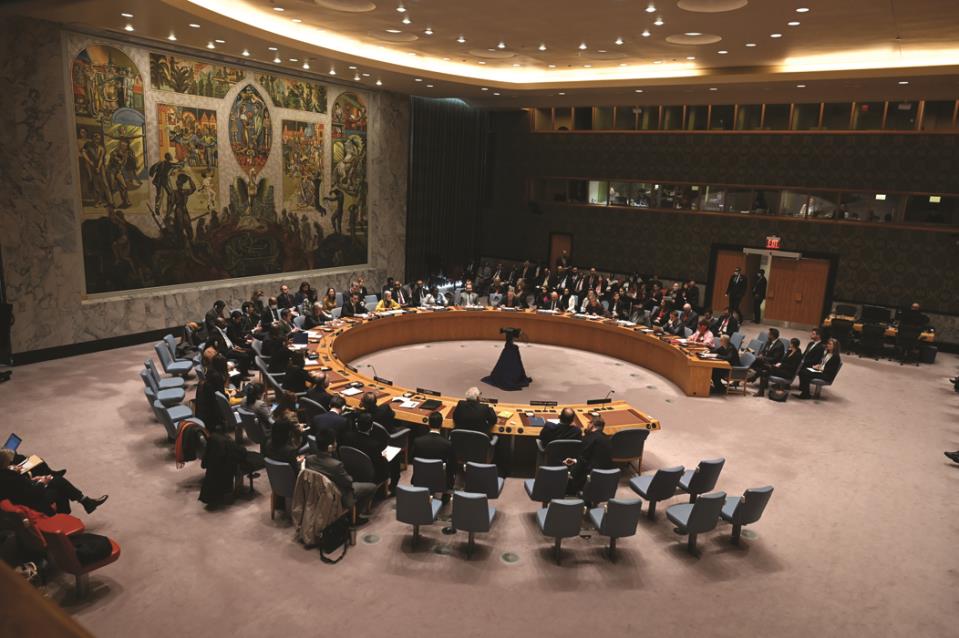The dire consequences that could result from rising sea-levels are no longer a discourse in rhetoric, with one billion people expected to be at risk from coast-specific climate hazards by the year 2060, Foreign Affairs Minister Ian Borg told the United Nations Security Council on Tuesday.
Borg on Tuesday chaired a UN Security Council open debate on sea-level rise and its implications for peace and security, as Malta’s presidency of the UN body continues.
The open debate follows a briefing held on Monday, which was also chaired by Malta, on the prevention of the use of children in armed conflict.
Speaking in his national capacity rather than as chair of the meeting, Borg highlighted that while wars and conflicts persist, “we are now increasingly aware of other global challenges that may exacerbate insecurity if left unchecked.”
“The manifestations of climate change are multi-fold and are felt across the globe. Ocean-related climate security risks are a daily reality to many countries, with such threats disproportionately affecting island states, small island developing states, coastal regions and low-lying cities, threatening their very existence,” Borg said.
He said that Malta as an island state knows this reality all too well, which is why it had first proposed the issue that climate change is a common concern to humankind at the United Nations.
Borg said that “sea-level rise unleashes threats to the existence, identity and security of peoples and nations.”
“These threats, both sudden and gradual, have the potential to wipe out entire communities and nations. Submerged coastlines will threaten critical infrastructure and precipitate disputes over scarce vital resources such as food and water while pushing our most vulnerable communities into further marginalization,” he said.
Borg noted that sea-level rise is already resulting in partial or total inundation of coastal areas, leading to the loss of land, housing and increased poverty, along with sea-water intrusion into agricultural lands and water tables which can push the most vulnerable communities into further marginalisation.
“The dire humanitarian consequences that could result from rising sea-levels are no longer a discourse in rhetoric. Science is already forecasting that up to 1 billion people will be at risk from coast-specific climate hazards by the year 2060, and hundreds of millions will be displaced by the year 2100. This pattern will only set to increase if no action is taken,” Borg said.
The consequences of sea-level rise have now reached a turning point for international peace and security, he said, adding that Malta believes that the Security Council must appropriately address these risks.
“It is amply clear that the issues created by sea level rise run through the very heart of state sovereignty as they represent a direct threat to the security of these areas, and to the people who call these areas their home. The potential loss of statehood, as one of the most severe consequences arising from rising sea-levels, as well as issues related to maritime boundaries and jurisdiction are an established theme in this discourse because of the associated far-reaching security implications,” he said.
Borg said that “the political and security consequences of sea-level rise reflect a potentially catastrophic reality which if left unaddressed may lead to a completely different world than the one we currently live in.”
Malta continues to be committed to ensure that the voices of those States and peoples most affected by these threats are heard, he said.

‘Rising seas are sinking futures’ – Antonio Gutierres
United Nations Secretary General Antonio Gutierres opened the open debate, thanking Malta for shining a light on the topic of rising sea-levels.
“Rising seas are sinking futures. Sea-level rise is not only a threat in itself. It is a threat-multiplier,” he said.
“For the hundreds of millions of people living in small island developing states and other low-lying coastal areas around the world, sea-level rise is a torrent of trouble. Rising seas threaten lives, and jeopardize access to water, food and healthcare. Saltwater intrusion can decimate jobs and entire economies in key industries like agriculture, fisheries and tourism,” Gutierres said.
“It can damage or destroy vital infrastructure — including transportation systems, hospitals and schools, especially when combined with extreme weather events linked to the climate crisis. And rising seas threaten the very existence of some low-lying communities and even countries,” he added.
He quoted World Meteorological Organisation data showing that the global average sea levels have risen faster since 1900 than in any other century in the last 3,000 years, and that the global ocean has warmed faster in the past century than at any time in the past 11,000 years.
He said that under any scenario, there is danger to 900 million people living in coastal zones – 10% of the global population – and that countries such as Bangladesh, China, India and the Netherlands and mega-cities such as Cairo, Lagos, Maputo, Bangkok, Dhaka, Jakarta, Mumbai, Shanghai, Copenhagen, London, Los Angeles, New York, Buenos Aires and Santiago are amongst those at grave risk.
He spoke of saltwater contamination of agricultural land and water tables globally, and of wide-scale melting of glaciers: Antarctica, according to NASA data, is losing an average of 150 billion tonnes per year, while the Greenland Ice Cap is melting even faster, losing 270 billion tons per year.
“The consequences of all of this are unthinkable. Low-lying communities and entire countries could disappear forever. We would witness a mass exodus of entire populations on a biblical scale. And we would see ever-fiercer competition for fresh water, land and other resources,” Gutierres said.
He said that this will create new sources of instability and conflict.

Gutierres said that the “rising tide” of insecurity must be met with action in three areas: addressing the climate crisis – which he said is the root cause of rising seas, broadening an understanding of the root causes of insecurity, and addressing the consequences of sea-level rise in legal frameworks and within the context of human rights.
“It means innovative legal and practical means to address human displacement which will result from rising sea levels. People’s human rights do not disappear because their homes do,” Gutierres said.
President of the United Nations General Assembly Csaba Kőrösi meanwhile said that the displacement of hundreds of millions of people as a result of rising sea levels is a security risk.
He noted that there are also legal questions to be raised: “What happens to a nation’s sovereignty, including its UN membership, if they sink below the sea? There are rules about the creation of a state, but none about physical disappearance. Who would care for people who are displaced? How would the changes of shorelines influence maritime borders?”
“We know the risks and we see that uncertainties and instabilities that we are going to face, and we cannot doubt that these will open the doors for disputes,” he said.
“If we do not work together, I fear that by 2100 – if not 2050 – the General Assembly will represent less than 193 countries,” he concluded.
The open debate was also addressed by the Environment and Resources Officer in the Sustainable Development Programme of the Pacific Islands Forum Secretariat Coral Pasisi – who warned that by 2050 the sea-level will have risen by one metre and that sea-level events which were initially 1 in 100 events will happen every year, thereby causing potential security risks – and Romanian Foreign Minister Bogdan Aurescu.